|
|
|
Sort Order |
|
|
|
Items / Page
|
|
|
|
|
|
|
| Srl | Item |
| 1 |
ID:
187163
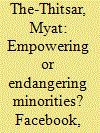

|
|
|
|
|
| Summary/Abstract |
Language policies play a major role in ethnic conflict because they affect the right of speakers to choose and use their preferred language(s), and help determine courses of action to maintain, assert or defend such rights. There has been insufficient analysis on the role of social media, particularly Facebook, in strengthening or undermining the survival of minority languages and collective identity in multi-ethnic countries. This paper uses Myanmar as a case study to demonstrate the extent to which Facebook language policies influence language use practices of minorities in Myanmar. While Facebook’s selection of Burmese as a ‘Facebook language’ has privileged the use of Myanmar’s majority language at the expense of its minority languages, it has simultaneously provided opportunities for ethnic minorities to preserve and promote their languages and cultures.
|
|
|
|
|
|
|
|
|
|
|
|
|
|
|
|
| 2 |
ID:
187160
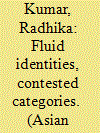

|
|
|
|
|
| Summary/Abstract |
The most recent demand for reservation quotas in India has come from the regionally dominant castes of the Jats and Patidars in the arena of education and employment. However, given their status as ‘dominant’ castes, it is paradoxical that these castes are claiming a ‘backward’ status. This demand raises questions of two kinds. Firstly, what is the nature of caste identity that they wish to leverage for purposes of gaining access to state quotas? Secondly, what are the different ways in which identities, expectations and mobilisations are shaped by electoral politics? The paper argues that ethnic identities are fluid which take on newer features and markers as they interact with categories of recognition that the state establishes. These negotiations have been exacerbated by electoral politics and the policy of economic liberalisation which have together upset dominant caste equations.
|
|
|
|
|
|
|
|
|
|
|
|
|
|
|
|
| 3 |
ID:
187159
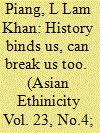

|
|
|
|
|
| Summary/Abstract |
Monuments with inscriptions have always been an important source of history and are helpful for reconstructing the past. They recreate collective memories, as they were erected to commemorate significant events from the past. The historical process of state formation, especially among the former colonies, has bound different ethnic communities, which obliges them to initiate state nation-building processes. So, memories which are recreated, remembered, and forgotten have played a crucial role in shaping ethnic relations as well as relations between the state and various ethnic communities in a multi-ethnic state. This paper analyses the allegation about the Manipur’s Chibu stone inscription as a fabricated historical event, and the complaint asking that its status as a protected archaeological site be denied. It argues that in the name of the state nation-building project, the state has resorted to recreating collective memories with little consideration to the sentiment of ethnic minorities in a state.
|
|
|
|
|
|
|
|
|
|
|
|
|
|
|
|
| 4 |
ID:
187164
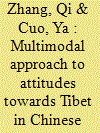

|
|
|
|
|
| Summary/Abstract |
Drawing on an examination of Chinese language textbooks for Tibetan ethnic students in the Tibet Autonomous Region of mainland China, this study scrutinises the representation of Tibetan images and the official attitude towards Tibet embedded in the textbooks. Using multimodal discourse analysis (MDA), the paper investigates how government perceptions of Tibet are constructed through the co-deployment of visual and textual semiotic resources in Chinese language textbooks. This study suggests an overall positive attitude towards Tibet shown in the textbooks. However, the references to Tibet or Tibetans are usually situated as topics of the ‘past’, which indicates a sense of their being uncivilised or backwards. The positive yet stereotyped portrayal of Tibet is in line with national identity construction to ensure a unified nation-state. This study examines both text and image in textbooks in order to understand state ideologies and official attitudes towards a minority group.
|
|
|
|
|
|
|
|
|
|
|
|
|
|
|
|
| 5 |
ID:
187166
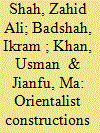

|
|
|
|
|
| Summary/Abstract |
This article seeks to explore the colonial encounters with Pashtuns of the erstwhile North West Frontier Province (now renamed as Khyber Pakhtunkhwa), Pakistan and their mythical Orientalist constructions in the colonial historical and ethnographic accounts of the late 18th, 19th, and 20th centuries. The recurring colonial images and the transformation of colonial discourses and post-colonial effects on Pashtun identity and society are analyzed in this research article. Noticeably, it looks into the paradigm shift from the anthropocentric views of Pashtuns to Orientalized and Europocentric ideas by applying Edward Said’s influential thesis of ‘Orientalism’ and integrating the work of other post-colonial thinkers. This research article draws upon archival, anthropological, ethnographic field data to supplement the textual analysis and challenge the Orientalist and colonial representation of Pashtuns. The ethnographic field data were gathered through in-depth interviews with various Pashtun intellectuals, poets, writers, and authors from various institutions in Peshawar and Charsadda. However, this research article demonstrates that there are colonial biases and Eurocentric constructions of Pashtuns in the colonial accounts and texts. The colonial biassed representations of Pashtuns are transformed into postcolonial discourses. Pashtuns and Pashtun society are still uncritically analyzed through colonial lenses and spectacles.
|
|
|
|
|
|
|
|
|
|
|
|
|
|
|
|
| 6 |
ID:
187165
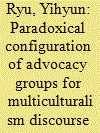

|
|
|
|
|
| Summary/Abstract |
This article demonstrates that the paradoxical configuration of groups supporting multiculturalism in South Korea stems from uniquely Korean experiences of colonialism, territorial division, and modernization. Unlike other societies, conservative political force advocates for multiculturalism and blames nationalism for its intolerance. On the other hand, its political counterparts have lingered on Korean nationalism, often presented as an antipode of multiculturalism. For exploring the antecedents of South Korean multiculturalism that contributed to shaping such configuration, I use the Foucauldian theoretical concept of governmentality and genealogy. Governmentality focuses on the conditions or circumstances under which policy problems are produced and genealogy allows us to trace back to its origin of the discourse, for de-familiarizing and dismantling the widespread perception of South Korean multiculturalism. This article explores how historical and geopolitical conditions have shaped engagement with multiculturalism discourse and how the emergence of post-nationalism laid the foundation for multiculturalism policy.
|
|
|
|
|
|
|
|
|
|
|
|
|
|
|
|
| 7 |
ID:
187161


|
|
|
|
|
| Summary/Abstract |
This paper discusses the political legacies of transmigration in local elections in Indonesia. Lampung province has an unusual ethnic make-up because in the past 100 years both the Dutch colonial administration and Indonesian Government have been implementing a transmigration programme. Transmigration has therefore changed the demographic pattern of Lampung. Since 2005, the mode of local election has been changed from indirect to direct. As a consequence of this, there is a revival of ethnic identity politics in local elections. In this paper, we focus on a transmigration affected area where the descendants of Javanese transmigrants are numerically dominant and correspondingly powerful in local politics. This research leads us to argue that ethnicity has become an important factor in local elections and that in transmigration affected areas it has led to the political domination of Javanese transmigrant descendants in local politics. We further to show how, in response to this, native Lampungese elites have adopted a number of strategies to help them retain a role in local politics. Our argument runs contrary to that of some scholars who have claimed that ethnicity is playing a diminishing role in Indonesian local elections.
|
|
|
|
|
|
|
|
|
|
|
|
|
|
|
|
| 8 |
ID:
187162


|
|
|
|
|
| Summary/Abstract |
This article analyzes a Taiwanese learning experience about the U.S. Civil Rights Movement, launching an educational project with 18 Taiwanese high school students to discuss their understanding of race, racism, and social justice. The rationale of analyzing the student participants’ comments rests on critical race theory. After analysis, this study found that Han ethnocentrism functions as a hidden identity and value system to influence the student participants to respond to racial issues. Han ethnocentrism caused the participants focusing on the racial experiences in Han groups and narrowed their understandings to the world. However, the result of this research also indicated that with a proper introduction, participants were willing and capable of developing racial sensitivity and affirmative attitudes about social justice toward minorities in Taiwan, such as Taiwanese Aboriginals and Southeast Asian migrant workers.
|
|
|
|
|
|
|
|
|
|
|
|
|
|
|
|
| 9 |
ID:
187167
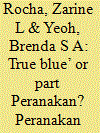

|
|
|
|
|
| Summary/Abstract |
While no longer associated with colonial economic and political privilege, Peranakan Chinese identity is now often viewed as an ‘authentic’ heritage in contemporary Singapore that is made visible through hybrid cultural and material markers. But for the Peranakan community, what does it mean to be authentically Peranakan in post-colonial Singapore? This paper explores concepts of hybridity and authenticity for Peranakan individuals, highlighting how being Peranakan is informed by ideas of belonging, mixedness and purity, from being ‘true blue’ to generational shifts towards being part Peranakan. Drawing on critical mixed race theory, the paper provides an historical overview of Peranakan identity in the region, tracing how ‘authentic’ Peranakan-ness has changed over time. Using a series of narrative interviews with self-identified Peranakan individuals across three generations, the paper explores public and private representations of identity, and how mixedness and purity are seen as being ‘authentic’ aspects of Peranakan culture.
|
|
|
|
|
|
|
|
|
|
|
|
|
|
|
|
|
|
|
|
|